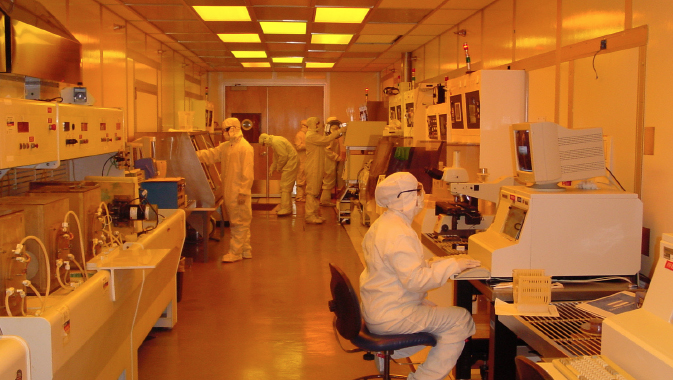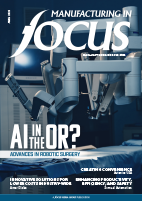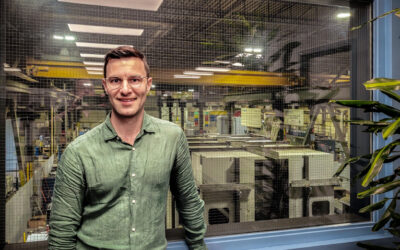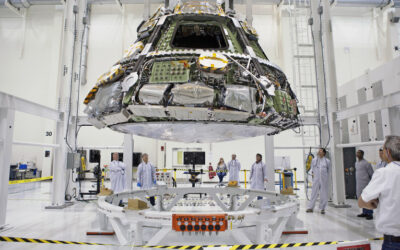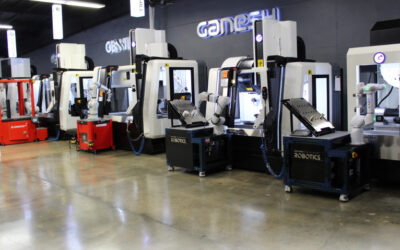Innovative Micro Technology (IMT) designs, develops, prototypes, and mass-produces microelectromechanical systems-related products, also known as MEMS. The Santa Barbara, California-based firm is a top-of-its-class technology and manufacturer services provider that offers a turnkey operation with excellent engineering expertise and customer support.
~
“Our comprehensive service is tailored for every customer. We offer everything from design and modeling to production,” states Director of Marketing and Sales Theodore Chi.
“There is a basic and simple way of looking at MEMS technology in that it is integrated into every day technology without people realizing that they are there. For example, if you have a smartphone and take a picture in landscape format and you rotate the phone to look at it horizontally, the picture automatically rotates. [This action] is enabled by the sensor, which is a type of MEMS device. It’s basically an electrical and a mechanical system that is miniaturized,” Chi explains.
There are many hundreds of different MEMS types in consumer electronics, communications, automotive, industrial, and defense. They include devices that measure and sense pressure changes, acceleration, presence of different chemicals, magnetic fields, and weight. There are devices that pump or divert fluids and devices that switch electrical, RF, or optical signals. IMT has experience in all these applications. IMT’s particular specialty is in front-end wafer fabrication, and boasts that it possesses ‘the largest MEMS production fab and most extensive suite of tools of any independent manufacturers in North America.’
Production takes place at a twelve-acre manufacturing compound. This locale also includes the company’s head office and a 30,000-square-foot Class 100 clean room. The latter is used for processing 6” and 8” wafers. While wafer processing technologies originated from the semiconductor industry, new processing technologies were developed with MEMS in mind. IMT also uses tools for metrology and testing equipment for failure analysis, electrical testing, and measurement.
The aim at IMT is to fulfill customer requests rather than create proprietary products. “We make a broad spectrum of MEMS devices and offer technology platforms and modules on processes and wafer-level packaging. We don’t make our own product in general. There’s a phrase called ‘pure-play foundry.’ It’s a generalized description of what we do. In the semiconductor industry, foundries offer set design rules and standardized processes that are done day in and day out without much deviation. The difference in MEMS is that a process for a device that operates in air may not work for a device that needs to operate in liquid or some other harsh environment.
IMT offers this breadth of experience of having developed over 500 different applications over its history. “That basically explains what we offer and why it separates IMT from everyone else,” states Chi. IMT’s extensive experience helps the firm stand out from competitors. In the technology world, where companies come and go at an alarming pace, being in existence for nearly two decades marks Innovative as a mature, seasoned business.
IMT has a multi-phase development process that begins with initial discussions with a client regarding the product design they had in mind. IMT will evaluate the design, to determine if it is practical to manufacture. If a business agreement is made between the client and IMT, the firm develops a process to make the product and creates a prototype. If all goes to plan, full-production ensues. The company boasts that it has shipped millions of MEMS products since its founding. Many others cannot claim they have successfully developed and transitioned programs into volume production and commercialization.
A close customer relationship is key to the development and production process. IMT engineers and other staff work very closely with clients, keeping in regular communication. IMT will provide office space to clients if they happen to represent companies with headquarters located far away from Southern California. IMT has “many clients in the West Coast, but we have customers all over the U.S. and internationally as well,” Chi says. He cannot speak about specific customers due to non-disclosure agreements. “Oftentimes, our customers don’t want to lead their competitors to the type of technology we offer,” he notes.
IMT has over one hundred employees, and it is busy hiring. Many of the engineers are hired straight out of universities, and maintaining very good relationships with professors helps with recruitment. “[When we hire someone] we look at the candidate’s experience, what they have done for their graduate work and whether their work is relevant to what we’re doing,” states Chi.
For prospective new hires, experience with MEMS technology is definitely a bonus, as is academic achievement. “I would say roughly fifteen to twenty percent of the company personnel have a Ph.D. or graduate degree,” notes Chi.
That said, even new employees with engineering graduate degrees need to adjust to IMT’s processes and methods. Making new engineers aware of the importance of preventative maintenance in mass production settings is part of this learning curve. “Oftentimes, there are Ph.D.s, when they first come out of school, what they’ve done at university is different from operating and working in a production facility,” explains Chi.
The company’s physical location is a major lure, given that Santa Barbara is close to beaches and mountains and boasts a warm climate and Southern Californian ambiance.
IMT promotes itself by attending trade shows, maintaining a social media presence, and by offering “relevant information for our potential end customers,” on the company website.
IMT has been certified to ISO 9001 for over 10 years and has a mature and effective quality assurance program. “While most customers are familiar with ISO 9001, our goal is compliance to the IATF 16949 automotive quality standard which adds an additional 20 control systems to the manufacturing process,” explains Victor Ella, the firm’s Director of Quality.
As a company focused on volume production, IMT utilizes a phase gate system designed to identify critical tasks at each phase in the development process. Gate reviews ensure the program is on track and authorized to move to the next phase.
IMT makes use of industry standard risk and quality control methods, like process Failure Mode Effects Analysis (pFMEA) and Statistical Process Control (SPC). IMT also develops custom applications for data management to ensure integrity, process control and product quality. These systems ensure products shipped meet customer requirements.
IMT has been recognized within the industry for its achievements. It was listed in the 2014 R&D 100 awards, compiled annually by trade publication R&D Magazine, for work on a product called the curled microelectromechanical switch (CMEMS).
IMT is also active on the industry trade association front. The company belongs to MEMS & Sensors Industry Group (MSIG), an industry organization that is currently strategic partners with SEMI, an association representing the global electronics supply chain for the manufacturing sector.
The biggest challenge facing IMT, ironically, has more to do with human behavior than high-tech. “While the technology is challenging, it’s the things that we can’t control that equally hinder development. Our end customers, they have a business plan, and they’re the ones funding the program, and they may have a board of directors that may not be fully aware of what is required to get to market. If they have insufficient funding or patience, then they will likely not succeed. You hear that nine out of ten startup companies fail. In our experience, they don’t budget enough or they’re on a schedule that’s not realistic,” says Chi.
A big part of IMT’s job is to be honest and educate the customers on what can be achieved given funding and time so that the customer understands and is aligned on the scope of work.
Nonetheless, he sees a very bright future within a few years’ time. “We should increase our capacity to three times, and hopefully the company will grow that much too. Our current capacity is about five thousand wafers a month. We’re hoping to get up to fifteen thousand wafers a month,” says Chi.

